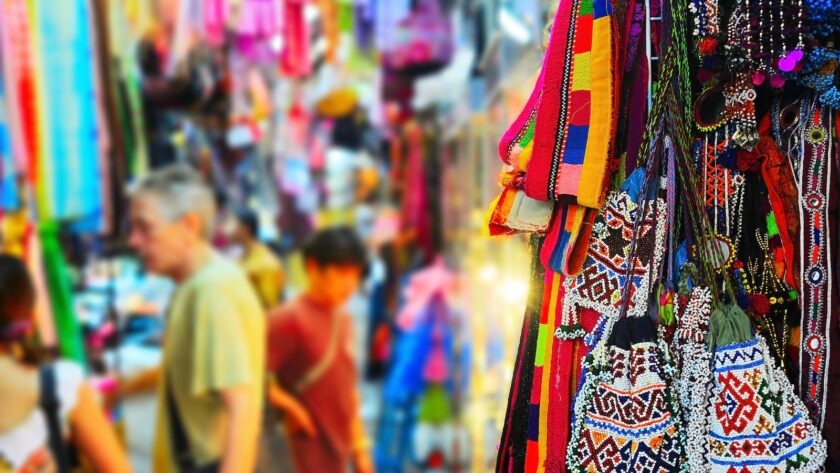
Most travelers have found themselves at some point browsing a market, haggling with the vendors about what price they think is fair. And while this type of behavior is expected when perusing artisan stalls — so much so that many vendors markup prices to make up for it, and typically don’t sell items with price tags — is it an ethical practice?
Like many responsible tourism issues, there are two sides to the story. According to Ian Ord of Where Sidewalks End, there is a fine line between bartering and bullying. What may seem like an insanely good deal to you may actually be a foreign of profit for a poor local just trying to feed his family. A savings of the equivalent of a few dollars could be the loss of a coffee for you, but an evening’s meal for an entire family for someone else.
It’s also worth noting that not haggling could lead to vendors getting away with “tourist tax” murder. Notes Turner Wright of Matador, “You shouldn’t cave to the bloated asking price without so much of a word of protest because you’re in a hurry or not in the mood for a good old-fashioned haggling; letting merchants believe they can get away with such deals will only drive up prices and could cause even more inflation.”
If you’re in a market where locals also shop, you run the risk of inflating the prices for them, as well. Think about it. If a vendor knows they can sell a mango to a local for $1, why would they sell it to a local for $0.25?
Bartering 101
So, how do you know when bartering is okay, and how much? Ord suggests doing some online research to see what the value of something should be. Moreover, ask around to other nearby vendors to get an idea of what the going rate on something is. Start there, and see if you can get the price down, or maybe strike a buy one get one free deal.
“The most important thing to remember to bartering successfully, and sustainably to the local culture, is to try and read the look the vendor is giving you,” explains Ord. “When bartering, please try and really listen to the words they are saying. If they try to tell you “this is less than what I paid” or look at you with desperation when you try to undercut them further, there’s a good chance you’ve reached what should be the lowest price.”
Also keep in mind there is big difference between negotiating for a fair price and straight being an ugly tourist. Berating locals and losing your mind over the difference of a dollar not only makes locals dislike tourists, it also makes you look like a bully. Is that how you want to appear to your host community? Hopefully not.
The Importance Of Buying Local
While we’re on the topic local markets and souvenir shopping, something to always be thinking about when traveling is the importance of buying local. One of the main foundations of responsible tourism is keeping and putting money into the local economy. That means staying in locally-owned and operated properties or homestays (yes, Airbnb counts), hiring local guides, eating food from locally-owned establishments and farmers, and purchasing gifts made and sold by locals.
Keep in mind, the fact you’re at a market doesn’t necessarily mean the items are local, although they often are. To be safe, ask. If you see a “Made in China” sticker and aren’t in China, walk away.
By shopping local, you boost the local economy, provide jobs for the community and repay the culture that has accepted you as a visitor.
There’s No Winner
Remember, when bargaining for a fair price both the buyer and the seller can leave the interaction happy. Both can be winners; the vendor with a profit for their work, and the traveler with a local momento of a memorable travel experience.
What are your thoughts on bartering at markets? Please share in the comments below.
Also Check Out:
Giant Pigs Swimming In The Azure Waters Of The Exumas, Bahamas, Caribbean
Artisans Of Rwanda: Meet Yusta, The Master Weaver
When, If Ever, Should You Boycott A Destination?
Jessica Festa
Latest posts by Jessica Festa (see all)
- A Culturally-Immersive Adventure In Mongolia’s Altai Mountains - Jul 8, 2023
- This Recipe Sharing Platform Supports Women In The Culinary Industry (Labneh Recipe Included!) - Nov 5, 2020
- Hiking The Mohare Danda Community Eco-Trek In Nepal - Jun 3, 2020
- 6 Important Questions For Choosing A Responsible Yoga Retreat - May 18, 2020
- How To Create & Grow A Profitable Blogging Business (Ethically) - Jan 18, 2020




